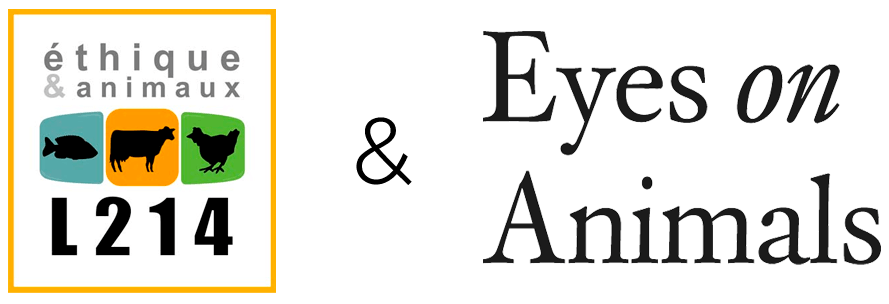
WHY DO LONG TRANSPORTS HAVE TO BE STOPPED URGENTLY?
In the dairy industry, cows are impregnated and give birth each year. Considered worthless because they do not produce milk, the newborn males are separated from their mothers and sold at very low prices to veal producers.
We recently trailed livestock lorries carrying calves from Ireland. After crossing the sea, they arrived at the port of Cherbourg in France. There, the calves are finally unloaded at a control post and fed rapidly, but also kicked and hit with sticks. They are reloaded after 12 hours.
The seemingly endless voyage finally terminates in The Netherlands, at an intensive veal farm where they will be confined indoors, on slatted floors with little space, for about 6 months before being brought to a slaughterhouse. Having travelled 2,000 km and over 50 hours this is the ordeal experienced by the 200,000 calves exported each year from Ireland.
More so today than ever before, these transports take on another dimension of concern due to the corona virus. If the aim is to reduce as much as possible the risk of spreading this virus, how can one justify that such non-indispensable transport is criss-crossing throughout Europe over such long distances? There is clearly an urgent need to halt the long-distance transport of live animals.
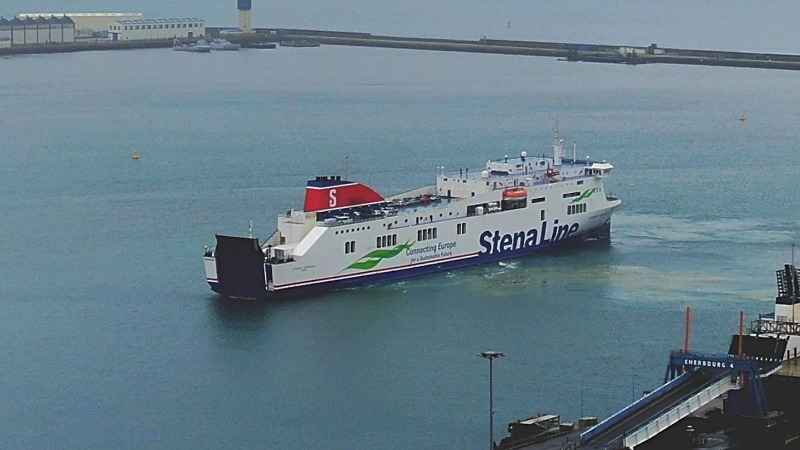
200 000 calves exported
On each crossing, roughly twenty animal trucks are embarked on a ferry owned by the company Stena Line.
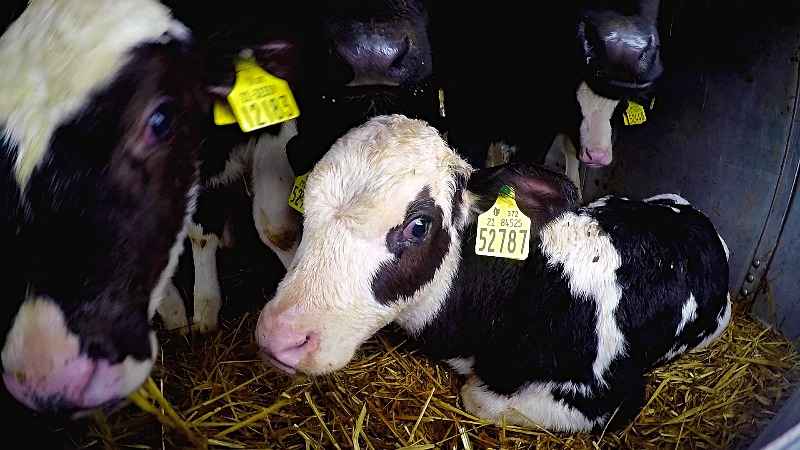
Unweaned calves
Three weeks of age, these calves, the by-product of the milk industry, are transported from Ireland to the Netherlands, a journey of 2000 km.
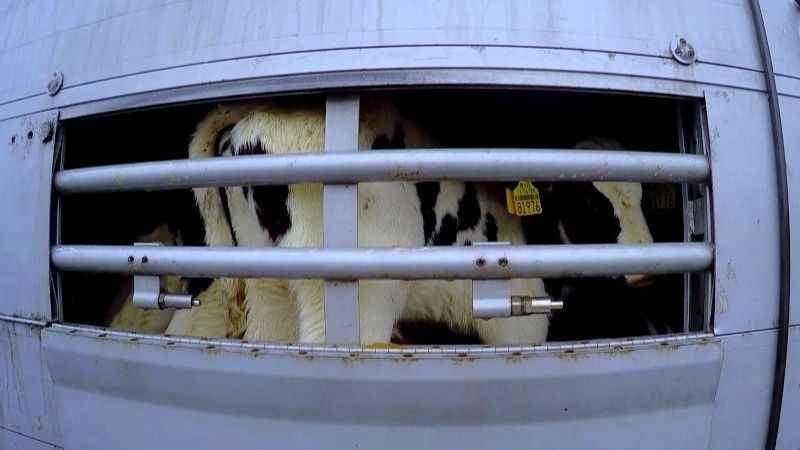
50 hours of transport
The drinking system on board is inadequate. The calves stay on board for longer than 24 hours without being fed, on a journey of longer than 50 hours.
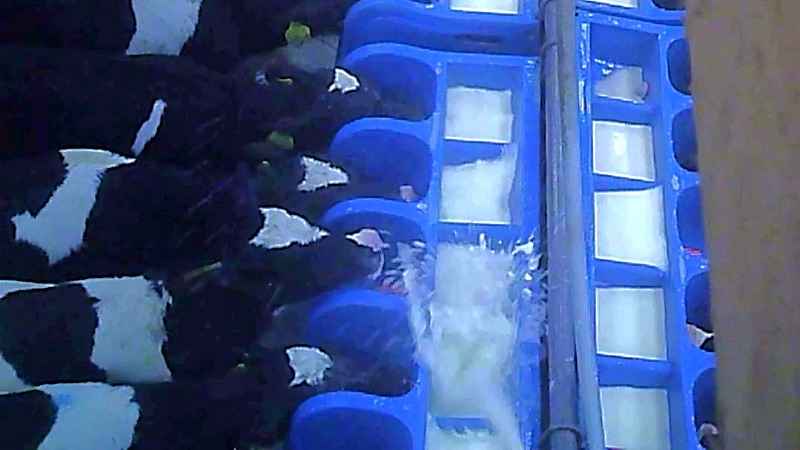
Thirsty calves
Young calves each need two litres of milk every 12 hours. They are only fed milk once during the entire 50-hour journey.
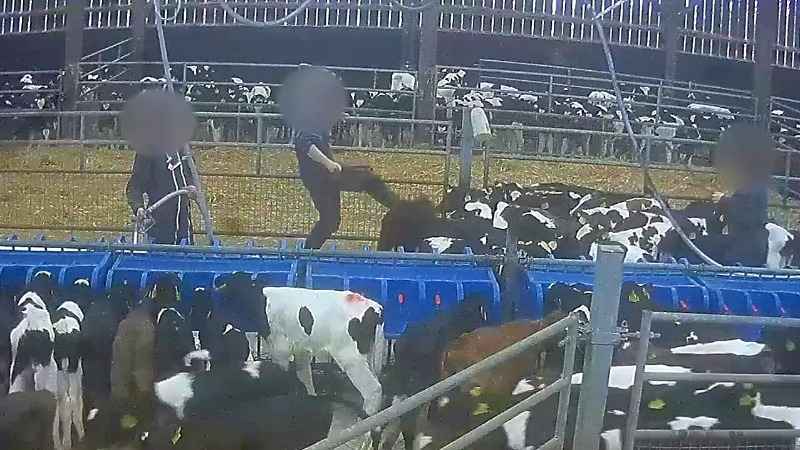
Abuse
Unloaded at a control post for feeding, the calves are kicked and beaten.
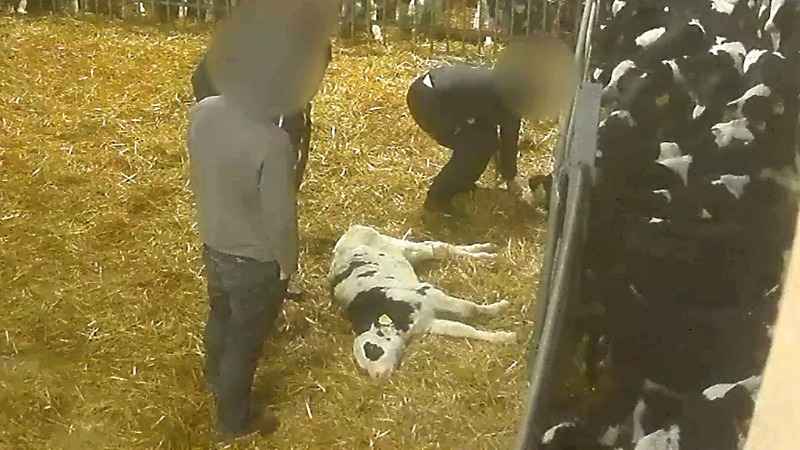
Exhausted calves
During transport, calves become extremely weak and tired, close to dying. Some have to be euthanized at the control post.
SIGN the petition
Emergency Covid-19:
stop long-distance transport of animals
Déjà … signatures !
Thank you for signing this petition!
The latest investigation by L214 and Eyes on Animals illustrates once again the horrible conditions unweaned calves transported from Ireland to the Netherlands via France must endure: four countries crossed, 2000 km travelled. Already exhausted from over one full day on board a lorry, these very young animals, separated prematurely from their mother, are unloaded at a control post near Cherbourg, France. Here they are finally given some milk, but in a rush, handled sometimes cruelly, and reloaded onto the lorries for another 900 km.
After more than a 50-hour journey, 18 of which are on a ferry, this terrible voyage ends in the Netherlands, where the calves are unloaded into factory farms where they will live in barren pens and kept indoors with little space for another 6 months before they are slaughtered.
Far from being an isolated case, this example shows the situation for millions of other animals transported on journeys of over 8 hours within the EU and to abroad. Under normal circumstances, these transport journeys are already unacceptable and appalling, as many investigations demonstrate. But today, with the rapid spread of Covid -19, these long tedious journeys of farm animals from one country to the next take on another outrageous dimension.
We are in the middle of a pandemic. With the international aim right now to reduce the spread of the virus as much as possible, how can it be justified sending animals criss-cross through Europe and even further abroad? Truck drivers, veterinarians, customs agents, control-post employees, farmers and slaughterhouse employees are all being exposed or could spread the virus during these long international journeys.
The European Commission is violating its own animal-welfare legislation during transport by allowing these journeys to take place, knowing full well that avoidable and risky suffering will take place during these displacements. Animal-welfare legislation during transport requires that no one is to transport or to cause to be transported animals in conditions that risk injury or unnecessary suffering. Additionally, the transport journey is to be carried out without any delay until the destination is reached and the animal welfare conditions must be regularly checked and maintained in an appropriate way.
Today the situation at borders, including those inside the European Union, is becoming more and more uncertain and changing daily in order to fight the spread of the virus. Long delays result in livestock trucks having to wait hours or turn around. As well, farm animals loaded on vessels and ferries are facing more and more complicated procedures: the waiting times at certain ports have tripled. And if a truck driver becomes sick during a long export journey, like this one of several days with Irish calves to the Netherlands, what happens to the animals stuck on board?
The conditions for animals during transport are often of huge concern even during “normal times”. They are now further degraded due to the irresponsibility of the European Commission continuing to allow long-distance exports during a pandemic.
We, the signatories of this petition, agree with and join the claims made by 35 NGOs and 42 Members of Parliament and insist that the European Commission:
• put an immediate stop on all long-distance transport of animals (above 8 hours)
• put an immediate stop to all transport of animals by sea
• put an immediate stop to the export of animals from the EU to third countries.
Thank you!
SHARE THIS INVESTIGATION TO GIVE IT MORE IMPACT
support Eyes on Animals
news
02.04.2020
L214 & Eyes on Animals published an investigative report that exposes the horrible conditions young calves endure when transported across Europe. -> read the press release

Eyes on Animals strives to reduce the suffering of farm animals by investigating and exposing their life conditions and improve law enforcement. Our aim is to create a society where the inherent worth of animals is recognized and respected.
Eyes on Animals
Eyesonanimals.com Mentions légales

